
Paris is the capital and most populous city of France. With an official estimated population of 2,102,650 residents as of 1 January 2023 in an area of more than 105 km2 (41 sq mi), Paris is the fourth-most populated city in the European Union and the 30th most densely populated city in the world in 2022. Since the 17th century, Paris has been one of the world's major centres of finance, diplomacy, commerce, culture, fashion, and gastronomy. For its leading role in the arts and sciences, as well as its early and extensive system of street lighting, in the 19th century, it became known as the City of Light.
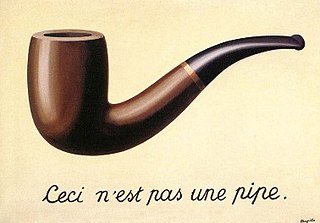
Surrealism is an art and cultural movement that developed in Europe in the aftermath of World War I in which artists aimed to allow the unconscious mind to express itself, often resulting in the depiction of illogical or dreamlike scenes and ideas. Its intention was, according to leader André Breton, to "resolve the previously contradictory conditions of dream and reality into an absolute reality, a super-reality", or surreality. It produced works of painting, writing, theatre, filmmaking, photography, and other media as well.
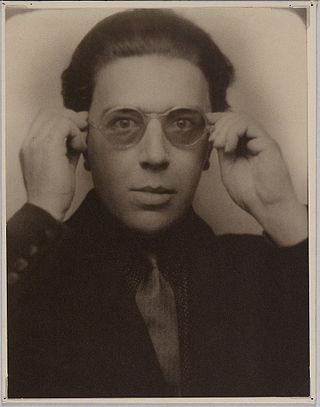
André Robert Breton was a French writer and poet, the co-founder, leader, and principal theorist of surrealism. His writings include the first Surrealist Manifesto of 1924, in which he defined surrealism as "pure psychic automatism".

Encyclopédie, ou dictionnaire raisonné des sciences, des arts et des métiers, better known as Encyclopédie, was a general encyclopedia published in France between 1751 and 1772, with later supplements, revised editions, and translations. It had many writers, known as the Encyclopédistes. It was edited by Denis Diderot and, until 1759, co-edited by Jean le Rond d'Alembert.

André-Aimé-René Masson was a French artist.

René Émile Char was a French poet and member of the French Resistance.

Robert Desnos was a French poet who played a key role in the Surrealist movement.
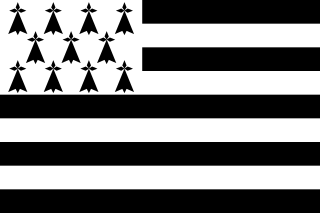
The flag of Brittany, a region in the northwest of France, is called the Gwenn-ha-du, which means white and black, in Breton. The flag was designed in 1923 by Morvan Marchal. It is also unofficially used in the department of Loire-Atlantique, although this now belongs to the Pays de la Loire and not to the region of Brittany, as the territory of Loire-Atlantique is historically part of the province of Brittany. Nantes, its prefecture, was once one of the two capital cities of Brittany.
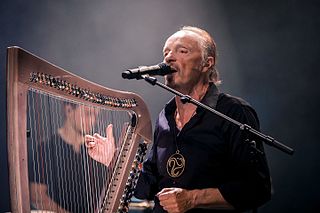
Alan Stivell is a Breton and Celtic musician and singer, songwriter, recording artist, and master of the Celtic harp. From the early 1970s, he revived global interest in the Celtic harp and Celtic music as part of world music. As a bagpiper and bombard player, he modernized traditional Breton music and singing in the Breton language. A precursor of Celtic rock, he is inspired by the union of the Celtic cultures and is a keeper of the Breton culture.

The 1907 Tour de France was the fifth running of the annual Tour de France, one of cycling's Grand Tours. From 8 July to 4 August, the 93 cyclists cycled 4488 km (2,788 mi) in fourteen stages around France. The winner, Lucien Petit-Breton, completed the race at an average speed of 28.47 km/h (17.69 mi/h). For the first time, climbs in the Western Alps were included in the Tour de France. The race was dominated at the start by Émile Georget, who won five of the first eight stages. In the ninth stage, he borrowed a bicycle from a befriended rider after his own broke. This was against the rules; initially he received only a small penalty and his main competitors left the race out of protest. Georget's penalty was then increased and Lucien Petit-Breton became the new leader. Petit-Breton won two of the remaining stages and the overall victory of the Tour.

Breton nationalism is the nationalism of the historical province of Brittany, France. Brittany is considered to be one of the six Celtic nations.

The Bretons are an ethnic group native to Brittany, north-western France. They trace their heritage to groups of Brittonic speakers who emigrated from southwestern Great Britain, particularly Cornwall and Devon, mostly during the Anglo-Saxon settlement of Britain. They migrated in waves from the 3rd to 9th century into Armorica, which was subsequently named Brittany after them.

Gilles Servat is a French singer, born in Tarbes in southern France in 1945, into a family whose roots lay in the Nantes region of Brittany. He is an ardent promoter ardent of the Breton culture, and sings in both French and Breton, as well as the other celtic languages, and was a member of Dan ar Braz's Héritage des Celtes. He is also a poet and novelist.

Roger Vitrac was a French surrealist playwright and poet.

Gilles de Rais, Baron de Rais, was a knight and lord from Brittany, Anjou and Poitou, a leader in the French army during the Hundred Years' War, and a companion-in-arms of Joan of Arc. He is best known for his reputation and later conviction as a confessed serial killer of children.
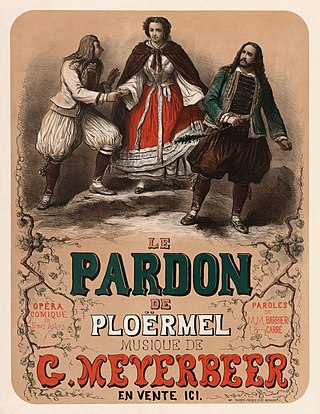
Dinorah, originally Le pardon de Ploërmel, is an 1859 French opéra comique in three acts with music by Giacomo Meyerbeer and a libretto by Jules Barbier and Michel Carré. The story takes place near the rural town of Ploërmel and is based on two Breton tales by Émile Souvestre, "La Chasse aux trésors" and "Le Kacouss de l'Armor", both published separately in 1850 in the Revue des deux mondes.

Paul Émile Ladmirault was a French composer and music critic whose music expressed his devotion to Brittany. Claude Debussy wrote that his work possessed a "fine dreamy musicality", commenting on its characteristically hesitant character by suggesting that it sounded as if it was "afraid of expressing itself too much". Florent Schmitt said of him: "Of all the musicians of his generation, he was perhaps the most talented, most original, but also the most modest". Peter Warlock dedicated his Capriol Suite to him and Swan Hennessy his Trio, Op. 54.
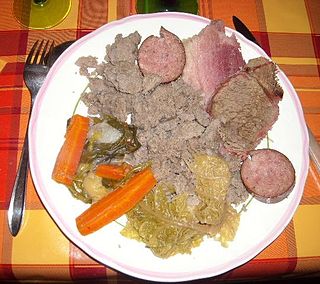
Kig ha farz is a cooked dish consisting of various meats simmered in a broth with a buckwheat flour based pudding. It is eaten traditionally in Brittany, more specifically around Léon in the region situated west from Morlaix to Brest. This dish, which is quite similar to a pot-au-feu, was once considered a dish for the poor and peasantry. The name in Breton literally means "meat and stuffing".

Jeanne de Clisson (1300–1359), also known as Jeanne de Belleville and the Lioness of Brittany, was a French/Breton noblewoman who became a privateer to avenge her husband after he was executed for treason by King Philip VI of France. She crossed the English Channel targeting French ships and often slaughtering their crew. It was her practice to leave at least one sailor alive to carry her message of vengeance.
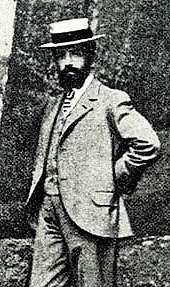
Pierre Lalo was a French music critic and translator. He was the son of the composer Edouard Lalo. His reviews for the Parisian paper Le Temps combined conservatism and wit; among his principal targets was the composer Maurice Ravel, whose music Lalo disparaged throughout his career. In addition to his journalistic work Lalo served on the governing boards of the Paris Conservatoire and the national radio station Radiodiffusion.



















